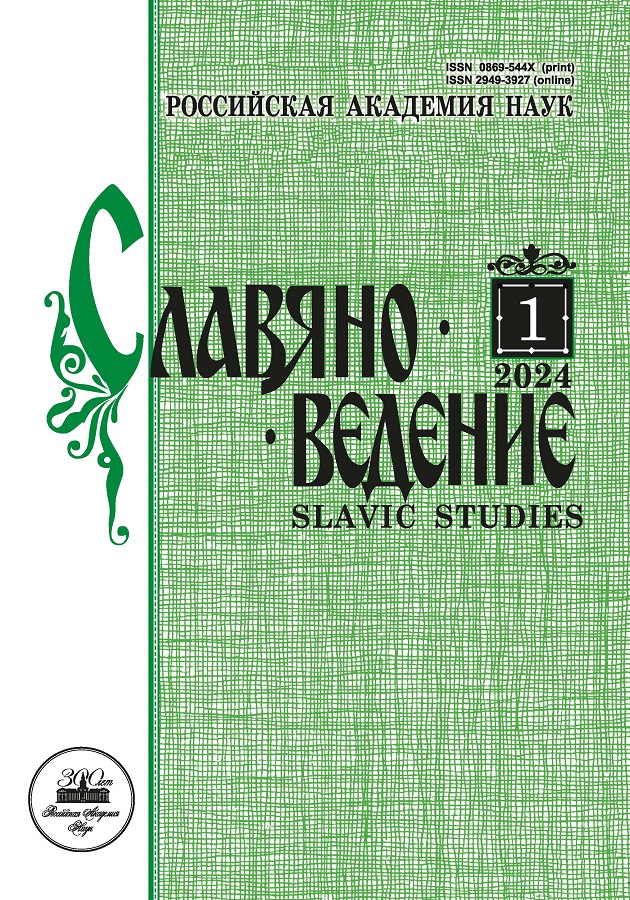The Slovak-Hungarian «Small War» in the Context of the Post-Munich Crisis in Bilateral Relations (March – September 1939)
- Authors: Salkov A.P.1
-
Affiliations:
- Belarusian State University
- Issue: No 1 (2024)
- Pages: 54-69
- Section: Articles
- URL: https://ruspoj.com/0869-544X/article/view/652977
- DOI: https://doi.org/10.31857/S0869544X24010042
- ID: 652977
Cite item
Abstract
The Munich Agreement had a profound effect on the national-territorial conflict between Czecho-Slovakia and Hungary. The first Vienna Award on November 2, 1938 resolved it in favor of Hungary. The consequences of the arbitration created a new configuration in the territorial dispute between autonomous Slovakia within the Second Republic and Hungary, involving Poland as well. Warsaw sought to obtain a joint Polish-Hungarian border, which led to the events of November 1938 – the Polish operation «Lom» in Transcarpathia failed, but local battles in the areas of Čadca and Javorina ended with the last adjustment of the post-Munich delimitation in favor of Poland. Since January 1939 incidents began on the Slovak-Hungarian border. In view of the threat of dismemberment of Slovakia on March 14, it declared independence. Hungary occupied Carpatho-Ukraine and then unleashed the «Small War» (March 23–31). Hungary received 1,050 sq. km with a population of 40 thousand people, half of whom were Slovaks. Slovak-Hungarian relations acquired a hostile character. Germany made the conflict between the two countries the subject of political blackmail, which was one of the reasons for their joining the fascist «axis».
Full Text
About the authors
Anatol P. Salkov
Belarusian State University
Author for correspondence.
Email: anatsalkov@mail.ru
PhD (History), Associate Professor,
Belarus, MinskReferences
- Becker A. Britský pohľad na Prvú viedenskú arbitráž. Juh Slovenska po Viedenskej arbitráži 1938–1945. Zborník z vedeckej konferencie (Šurany 22. –23. marca 2011), zostavil J. Mitáč. Bratislava, Ústav pamäti národa Publ., 2011, pp. 118–135.
- Brenzovics L. Nemzetiségi politika a visszacsatolt Kárpátalján (1939–1944). Ungvár, Kárpátaljai Maguar Kulturális Szövetség Publ., 2010, 204 p.
- Fedinec C. «A Maguar Szent Koronához visszatért Kárpátalja» 1938–1944. Budapest, Jaffa Kiadó Publ., 2015, 250 p.
- Fukala J. Československo-polský konflikt u Čadce v listopadu 1938. Available at: https://www.fronta.cz/dotaz/ceskoslovensko-polsky-konflikt-u-cadce-v-listopadu-1938 (accessed: 18.09.2015).
- Hoensch J. K. Slovensko a hitlerova východná politika: Hlinkova slovenská ľudová strana medzi autonómiou a separatizmom 1938–1939. Bratislava, Veda Press., 2001, 231 p.
- Istorija Slovakii, otv. red. Jelena Mannova. Moscow, Evrolinc Publ., 2003, 418 p. (In Russ.)
- Jašek P. Malá vojna v slovenskej historiografii. Malá vojna v marci 1939 a jej miesto v pamäti národa: zborník príspevkov z koferencie organizovanej Ústavom pamäti národa a mestom Spišská Nová Ves v dňoch 19. –20. marca 2015, zost. M. Lacko, M. Malatinský. Krakov, Spolok Slovákov v Poľsku Press.; Bratislava, Múzeum ozbrojených zložiek SR Press., 2016, pp. 127–152.
- Kazak O. G. Rusinskij vopros kak argument v pogranichnyh sporah mezhdu Vengriej i Slovakiej (1939– 1944 gg.). Rossijsko-belorussko-ukrainskoe pogranichʼe: problemy vzaimodejstvija v kontekste edinogo sociokulʼturnogo prostranstva: materialy mezhd. nauchnoj konferencii (Novozybkov, Brjanskaja obl., 23–24 oktjabrja 2014 g.): v 2 ch., red Mishhenko V. V. Ch. 1. Brjansk, Ladomir Press., 2014, pp. 412– 421. (In Russ.)
- Kovalevich P. Pravednyj aristokrat. Available at: http://www.jewish.ru/history/facts/2011/11/news994302074.php (accessed: 20.09.2015). (In Russ.)
- Kubík P. Slovensko-talianske vzťahy: 1939–1945. Bratislava, Ústav pamäti národa Publ., 2010, 355 p.
- Lasko M. Maďarský vpád na Slovensko v marci 1939 a jeho ohlas. Juh Slovenska po Viedenskej arbitráži 1938–1945. Zborník z vedeckej konferencie (Šurany 22. –23. marca 2011), zostavil J. Mitáč. Bratislava, Ústav pamäti národa Publ., 2011. pp. 200–216.
- Marʼina V. V. Slovakija v politike SSSR i Germanii. Vostochnaja Evropa mezhdu Gitlerom i Stalinym. 1939–1941 gg., otv. red. V. K. Volkov, L. J. Gibianskij. Moscow, Indrik Publ., 1999, pp. 198–240. (In Russ.)
- Mičianik P. Malá vojna Maďarska proti Slovensku 1938–1939. Banská Bystrica, Dali-BB Press., 2019. 524 p.
- Peganov A. O. Cheho-slovacko-vengerskie peregovory v nojabre 1938 – marte 1939 g. o realizacii Venskogo arbitrazhnogo reshenija. Rossijskie i slavjanskie issledovanija: nauch. sb. Vyp. 4, otv. red. A. P. Salʼkov, O. A. Janovskij. Minsk, BGU Press., 2009, pp. 205–210. (In Russ.)
- Petrík J. Bombardovanie Spišskej Novej Vsi // Malá vojna v marci 1939 a jej miesto v pamäti národa: zborník príspevkov z koferencie organizovanej Ústavom pamäti národa a mestom Spišská Nová Ves v dňoch 19. –20. marca 2015, zost. M. Lacko, M. Malatinský. Krakov, Spolok Slovákov v Poľsku Press.; Bratislava, Múzeum ozbrojených zložiek SR Press., 2016, pp. 104–118.
- Petruf P. Zahraničná politika Slovenskej republiky 1939–1945: (náčrt problematiky). Bratislava, Historický ústav SAV Press., 2011, 328 p.
- Pushkash A. I. Vneshnjaja politika Vengrii. Fevralʼ 1937 – sentjabrʼ 1939 g. Moscow, Institut slavjanovedenija RAN Publ., 2003, 460 p. (In Russ.)
- Pushkash A. Civilizacija ili varvarstvo: Zakarpatʼe 1918–1945. Moscow, Evropa Press., 2006, 564 p. (In Russ.)
- Ristveyová K., Hruboň A., Mitáč J. Prvá Viedenská arbitráž a Slovensko (medzinárodné súvislosti, výsledky a dôsledky). Dve viedenské arbitráže (1938, 1940) z pohľadu slovenskej a rumunskej historiografie. R. Mârza, M. Syrný a kol. Banská Bystrica, Múzeum Slovenského Národného Povstania Publ., 2018, pp. 12–25.
- Saľkov A. P. Sovietsky zväz a formovanie prvých predstáv o povojnovej československo-maďarskej hranici (marec 1939 – jún 1941). Acta Historica Neosoliensia: Vedecký časopis pre historické vedy, šefredactor I. Nagy, t. XIII (2010), vol. 1–2. Banská Bystríca, Katedra histórie Fakulty humanitných vied Univerzity Mateja Bela v Banskej Bystrici Press., pp. 149–163.
- Salkov A. P. Venskij tretejskij sud (Pervyj Venskij arbitrazh): istoricheskie uslovija provedenija, mehanizm realizacii, politicheskie posledstvija (mart 1938 – ijunʼ 1941 g.). Aktualʼnye problemy slavjanskoj istorii: sbornik nauchnyh statej, posvjashhennyj 70-letiju G. F. Matveeva. Moscow, MGU Press., 2013, pp. 122– 134. (In Russ.)
- Salkov A. P. Nacional’no-territorial’nye konflikty v Central’no-Vostochnoj Evrope vo vneshnej politike SSSR (1938–1949 gg.). Minsk, BGU Press., 2019, 743 p. (In Russ.)
- Simon A. Maguar idők a Felvidéken 1938–1945. Az első bécsi döntés és következményei. Budapest, Jaffa Kiadó Press., 2014, 247 p.
- Szeghalmy G. Felvidék. Budapest, Magyar Városok Monográfiája Kiadóhivatala Pabl., 1940. Available at: http://library.hungaricana.hu/hu/view/SOMORJA_felvidek/?pg=0&layout=s (accessed: 20.10.2015).
- Valo P. Odraz Malej vojny v kinematografii a publicistike po roku 1990. Malá vojna v marci 1939 a jej miesto v pamäti národa: zborník príspevkov z koferencie organizovanej Ústavom pamäti národa a mestom Spišská Nová Ves v dňoch 19. –20. marca 2015, zost. M. Lacko, M. Malatinský. Krakov, Spolok Slovákov v Poľsku Press.; Bratislava, Múzeum ozbrojených zložiek SR Press., 2016, pp. 177–185.
- Volkov V. K. Mjunhenskij sgovor i Balkanskie strany. Moscow, Nauka Publ., 1978, 340 p. (In Russ.)
- Vrábel F. Maďarsko-slovenský konflikt v maďarskej historiografii a publicistike. Malá vojna v marci 1939 a jej miesto v pamäti národa: zborník príspevkov z koferencie organizovanej Ústavom pamäti národa a mestom Spišská Nová Ves v dňoch 19. –20. marca 2015, zost M. Lacko, M. Malatinský. Krakov: Spolok Slovákov v Poľsku Press.; Bratislava: Múzeum ozbrojených zložiek SR Press., 2016, pp. 119–126.
- Vrábel F. Prvá Viedenská arbitráž – maďarský pohľad. Dve viedenské arbitráže (1938, 1940) z pohľadu slovenskej a rumunskej historiografie, R. Mârza, M. Syrný a kol. Banská Bystrica, Múzeum Slovenského Národného Povstania Publ., 2018, pp. 26–31.
Supplementary files











